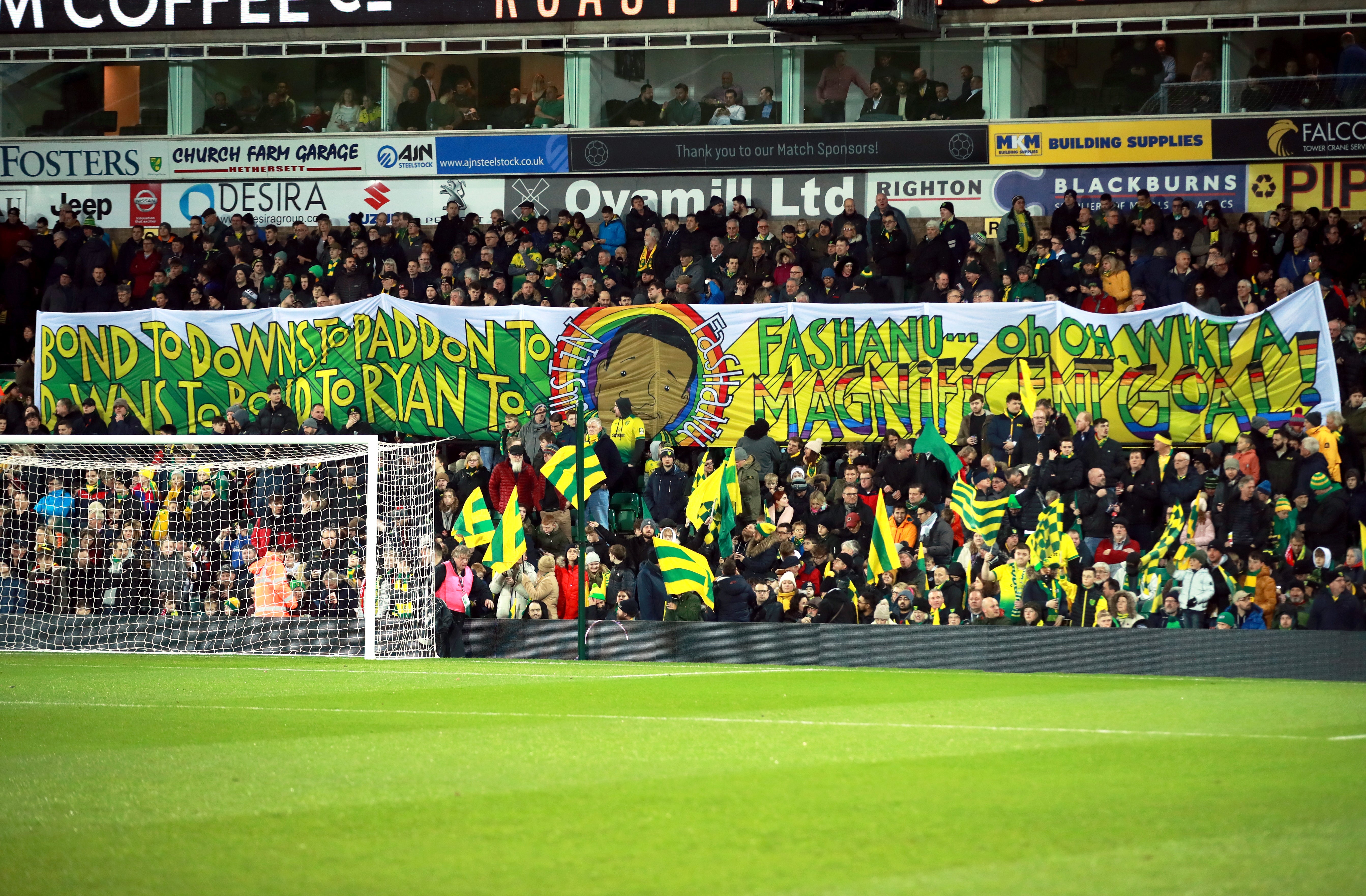Proud Canaries: Education and engagement are crucial in fight against homophobia
Norwich’s match programme on Saturday will be dedicated to both LGBTQ+ History Month and Football v Homophobia

Your support helps us to tell the story
From reproductive rights to climate change to Big Tech, The Independent is on the ground when the story is developing. Whether it's investigating the financials of Elon Musk's pro-Trump PAC or producing our latest documentary, 'The A Word', which shines a light on the American women fighting for reproductive rights, we know how important it is to parse out the facts from the messaging.
At such a critical moment in US history, we need reporters on the ground. Your donation allows us to keep sending journalists to speak to both sides of the story.
The Independent is trusted by Americans across the entire political spectrum. And unlike many other quality news outlets, we choose not to lock Americans out of our reporting and analysis with paywalls. We believe quality journalism should be available to everyone, paid for by those who can afford it.
Your support makes all the difference.Education and engagement must continue to play a crucial role in football’s ongoing battle against homophobia, according to the co-founder of LGBTQ+ fans group Proud Canaries.
Norwich are dedicating Saturday’s programme for the home game against Premier League leaders Manchester City to both LGBTQ+ History Month and the Football v Homophobia campaign.
It will include articles on former Canaries striker Justin Fashanu who in 1990 became the first male professional to come out as gay while still playing. He took his own life in 1998, aged 37.
Di Cunningham helped found the Proud Canaries in 2013, at a time when it felt very much like LGBTQ+ supporters “parked identity at the turnstyle when you come in”.
While the outlook is now much more inclusive, she feels football remains “a little bit behind the curve”.
Cunningham told the PA news agency: “We have been really, really lucky. Because of the Justin heritage (at Norwich), it hasn’t been that tricky – but that is not to say that there haven’t been hiccups along the way.
“When we went on that first pitch parade – which was a pretty ‘outing’ experience because you are just there because you are gay or trans – somebody shouted out from the crowd: ‘don’t clap them, shoot the F-words’.
“But that in itself was an opportunity, because it was an opportunity for other fans around this person to say ‘mate, that is not acceptable’, he was reported and he was dealt with (by the club), but it wasn’t a ban.
“Some clubs will say: ‘you will have a life-time ban for that kind of thing’, but football is changing, the world is changing.
“We need to recognise that and give people the opportunity to change and to learn.”
Earlier this year, the Crown Prosecution Service announced a decision to define the use of the term ‘rent boy’ in a chant as a homophobic slur.
Any fans singing the words during matches will be committing a hate crime and so be liable to face prosecution.
Cunningham feels tackling the issues raised head on can also help educate supporters.
“The key really is to understand that people get swept up in these things – with the ‘rent boy’ chant, people don’t even know what it means, that it is homophobic,” she said.
“Once you point it out to people, there are a lot who will say ‘I’m really sorry, you are a fan of my club and I want you to be welcome, so I’m not going to sing that anymore’.
“Other people kind of double-down, and they are the difficult ones, who say ‘well we have always sang it, it’s not homophobic so I am going to carry on singing it.'”
Cunningham added: “Our visibility as LGBTQ+ fans, whether it is at our clubs, on a national or international platform, changes the game because people recognise that football has changed and that we should be made to feel as welcome as everyone else.
“And a lot of people are saying ‘thank goodness we can see LGBTQ+ fans at football because that makes us feel better and it means that the game that we love is developing and it’s keeping up with society’.”
Fashanu went on to become the first black footballer to command a £1million transfer fee with his move from Norwich to Nottingham Forest in 1981. The striker played for a total of 22 clubs in England, North America, Scotland and New Zealand.
No male professional has come out while still in the English game since Fashanu. Although former Aston Villa midfielder Thomas Hitzlsperger and ex-Leeds winger Robbie Rogers did so after they finished playing here.
“If the number of out males footballers reflected that in other sports for male athletes, never mind the national representation of gay males in the community, we probably wouldn’t be having this month any more,” Cunningham said.
Football here in the UK still seems such a toxic environment that those guys aren't able to be out.
“It is so stark, that lack of somebody in 2022 in the elite male game who is prepared to acknowledge in public who they are and who they love.
“It is kind of unthinkable that we had this conversation in 2013 when Proud Canaries was formed and we are still having it now – and have been since Justin Fashanu died.
“Football here in the UK still seems such a toxic environment that those guys aren’t able to be out.”
Norwich head coach Dean Smith hopes all supporters will receive a warm welcome at Carrow Road.
“Every person who comes to a football match should come feeling happy, not under any threat of any kind and feel wanted,” he said.
“We support all of the campaigns because we want everybody to feel equal when they come to the game.”